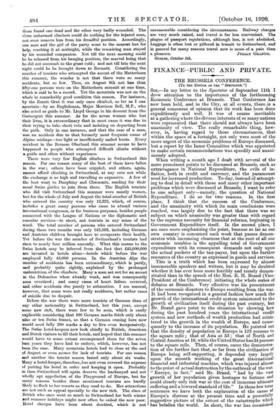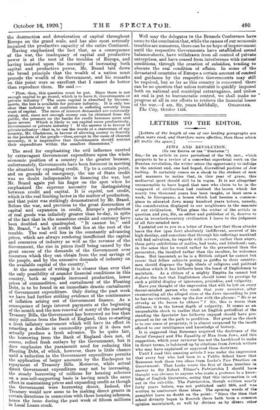FINANCE—PUBLIC AND PRIVATE.
THE BRUSSELS CONFERENCE.
[To Tire EnrrOB or Tar " BrIlarATOR."] SIR,—In my letter to the Spectator of September 11th I drew attention to the importance of the forthcoming Economic Conference at Brussels. That Conference has now been held, and in the City, at all events, there.is a general consensus of opinion that its work has been done expeditiously and well. It was of course inevitable at a gathering where the diverse interests of so many nations were represented that there should not always have been unanimity of view. The really remarkable thing, how- ever, is, having regard to those circumstances, that within the space of a fortnight, not only were most of the more urgent of the economic prohlems of Europe discussed, but a report by the Inner Committee which was Appointed to make certain recommendations was speedily and unani- mously adopted. When writing a month ago I dealt with several of the more prominent points to be discussed at Brussels, such as extravagance in National Expenditure, the evils of in- flation, both in credit and currency, and the paramount need for increased production. To-day, instead of attempt- ing to deal in detail with these and many other important problems which were discussed at Brussels, I want to refer to one subject only—namely, the question of National Expenditure. I do so for two reason% In the first place, I think that the success of the Conference, and the unanimity with which its main conclusions were reached, was largely due to the fact that there was no subject on which unanimity was greater than with regard to the supreme necessity for financial reforms, beginning in Government Expenditure itself. In the second place, I am once more emphasizing the point, because so far as our own country is concerned each week that passes demon- strates with increasing clearness that at the root of all our economic troubles is the appalling total of Government expenditure with its consequent demands not only upon the actual pockets of the tax-payer, but upon the further resources of the country as expressed in goods and services. This is a truth which has been expressed by almost innumerable speakers and writers, but it may be doubted whether it has ever been more forcibly and tersely demon- strated than in the speech of the Hon. R. H. Brand (Vice- President of the Conference) initiating the whole series of debates at Brussels. -Very effective was his presentment of the economic disasters to Europe resulting from the war. It had been recognized in a general fashion how much the growth of the international credit system ministered to the growth of civilization itself during the past century, but . Brand gave point to the situation by showing how during the past hundred years the international credit system and new methods of wealth production had minis- tered to the growth in the wealth of Europe, and conse- quently to the increase of its population. He pointed out that the density of population in Europe is 123 persons to the square mile ; that of Asia at 63 ; that of North and Central America at 16, while the United States has 34 persons to the square mile. Then, of course, came the demonstra- tion of the further fact that, so far from the civilization of Europe being self-supporting, it depended very largely upon the smooth working of the great international financial and industrial machine, which was injured almost to the point of actual destruction by the outbreak of the war. "Europe, in fact," said Mr. Brand, "had by the vast growth of her population given hostages to fortune and could clearly only risk war at the cost of immense ultimate suffering and a lowered standard of life." In these few terse sentences we have both the explanation of the cause of Europe's distress at the present time and a powerfa.119 suggestive picture of the extent of the catastrophewhich, has befallen the world. In short, the war has occasioui° the destruction and deterioration of capital throughout Europe on the grand scale, and has also most seriously impaired the productive capacity- of the entire Continent. Having emphasized the fact that, as a consequence of the war, the inadequacy of capital and productive power is at the root of the troubles of Europe, and having insisted upon the necessity of increasing both capital and productive power, Mr. Brand laid down the broad principle that the wealth of a nation must precede the wealth of its Government, and his remarks on this point were so excellent that I cannot do better than reproduce them. He said :— " rust, then, this question must be put. Since there is not enough capital to go round, which is to have it, Governments or private industry ? The more capital is absorbed by Govern- ments, the leas is available- for private industry. It is only too dear that industry in all countries is suffering severely from want of capital. The rates of interest demanded are constantly rising, and, since not enough money can be obtained from the public, the pressure on the banks for credit beeomes more and more severe. Which is likely to use capital moreproductively, Government or private industry ? If the answer is in favour of private industry—that is, to use the words of a statesman of my country, Mr. Gladstone, in favour of allowing money to fructify in the pockets of the people—then, except in the oases of clearest necessity, it is imperative that Governments should restrict their expenditure within the smallest dimensions."
The need for emphasizing the evil influence exerted by extravagant Government expenditure upon the whole economic position of a country is the greater because, unfortunately, Governments have been foremost in meeting the situation by expanding credit. Up to a certain point, and on grounds of emergency, the use of State credit was no doubt indispensable in financing the war, but Mr. Brand again put his finger on the spot when he emphasized the supreme necessity for distinguishing between credit and capital. It is capital, not credit, which is the real limiting factor in the matter of production, and that point was strikingly demonstrated by Mr. Brand. Before the war, and previous to the great destruction of capital and expansion in credit, Europe's production of real goods was infinitely greater than to-day, in spite of the fact that in the meantime credit and currency have been doubled and quadrupled. "It cannot be,' said Mr. Brand, "a lack of credit that lies at the root of the trouble. The real evil lies in the constantly advancing prices, which are always rendering insufficient the capital and resources of industry as well as the revenue of the Government, the rise in prices itself being caused by the great excess of the demands of the Government over resources which they can obtain from the real savings of the people, and by the excessive demands of industry on the available capital of the country." At the moment of writing it is clearer than ever that the only possibility of sounder financial conditions in this country, both as regards increased production, lower prices of commodities, and curtailment of the Floating Debt, is to be found in an immediate drastic curtailment of Government expenditure. Only during the past week we have had further striking evidence of the continuance of inflation arising out of Government finance. As a consequence of large interest payments at the beginning of the month and the non-renewal of many of the maturing Treasury Bills, the Government has borrowed no less than Sixty millions from the Bank of England, thus re-starting a fresh inflatory movement which will have its effect in retarding a decline in commodity prices if it does not actually produce a fresh advance. To be quite fair, the borrowing from the Bank of England does not, of course, reflect fresh outlays by the Government, but it does emphasize the paramount need for reducing this Floating Debt, of which, however, there is little chance until a reduction in the Government expenditure permits the application of larger amounts by the Exchequer to repayment of Treasury Bills. Moreover, while actual direct Government expenditure may not be increasing, the steady borrowing of millions for housing schemes on a non-self-supporting basis is having much the same effect in maintaining prices and expanding credit as though the Government were borrowing direct. Indeed, the Treasury woUld now seem to be making direct grants in certain directions in connexion with these housing schemes, hence the issue during the past week of fifteen millions in Local Loans stock. Well may the delegates to the Brussels Conference have come to the conclusion that, while the causes of our economic troubles are numerous, there can be no hope of improvement until the respective Governments have established sound balance-sheets, have withdrawn from all control of private enterprises, and have ceased from interference with natural conditions, through the creation of subsidies, tending to obscure the real condition of affairs. In some of the devastated countries of Europe a certain amount of control and guidance by the respective Governments may still be required, but so far as this country is concerned there can be no question that unless restraint is quickly imposed both on national and municipal extravagance, and. unless an end is put to bureaucratic control, we shall make no " progress at all in our efforts to retrieve the financial losses of the war.—.I am, Sir, yours. faithfully, ONLoosEs.
The City, October 14th.







































 Previous page
Previous page